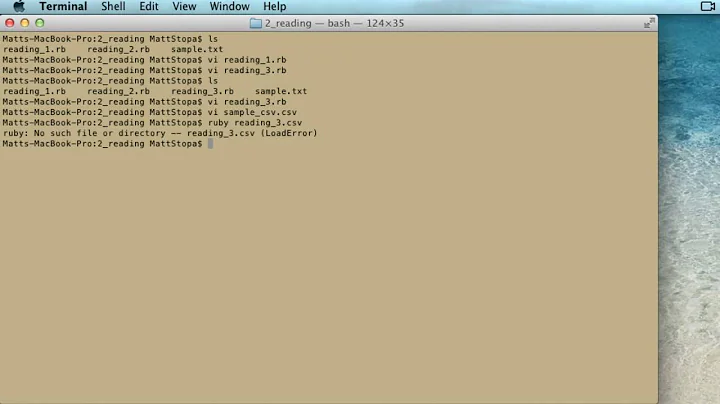What are all the common ways to read a file in Ruby?
Solution 1
File.open("my/file/path", "r") do |f|
f.each_line do |line|
puts line
end
end
# File is closed automatically at end of block
It is also possible to explicitly close file after as above (pass a block to open closes it for you):
f = File.open("my/file/path", "r")
f.each_line do |line|
puts line
end
f.close
Solution 2
The easiest way if the file isn't too long is:
puts File.read(file_name)
Indeed, IO.read or File.read automatically close the file, so there is no need to use File.open with a block.
Solution 3
Be wary of "slurping" files. That's when you read the entire file into memory at once.
The problem is that it doesn't scale well. You could be developing code with a reasonably sized file, then put it into production and suddenly find you're trying to read files measuring in gigabytes, and your host is freezing up as it tries to read and allocate memory.
Line-by-line I/O is very fast, and almost always as effective as slurping. It's surprisingly fast actually.
I like to use:
IO.foreach("testfile") {|x| print "GOT ", x }
or
File.foreach('testfile') {|x| print "GOT", x }
File inherits from IO, and foreach is in IO, so you can use either.
I have some benchmarks showing the impact of trying to read big files via read vs. line-by-line I/O at "Why is "slurping" a file not a good practice?".
Solution 4
You can read the file all at once:
content = File.readlines 'file.txt'
content.each_with_index{|line, i| puts "#{i+1}: #{line}"}
When the file is large, or may be large, it is usually better to process it line-by-line:
File.foreach( 'file.txt' ) do |line|
puts line
end
Sometimes you want access to the file handle though or control the reads yourself:
File.open( 'file.txt' ) do |f|
loop do
break if not line = f.gets
puts "#{f.lineno}: #{line}"
end
end
In case of binary files, you may specify a nil-separator and a block size, like so:
File.open('file.bin', 'rb') do |f|
loop do
break if not buf = f.gets(nil, 80)
puts buf.unpack('H*')
end
end
Finally you can do it without a block, for example when processing multiple files simultaneously. In that case the file must be explicitly closed (improved as per comment of @antinome):
begin
f = File.open 'file.txt'
while line = f.gets
puts line
end
ensure
f.close
end
References: File API and the IO API.
Solution 5
One simple method is to use readlines:
my_array = IO.readlines('filename.txt')
Each line in the input file will be an entry in the array. The method handles opening and closing the file for you.
Related videos on Youtube
dsg
Updated on December 05, 2020Comments
-
dsg over 3 years
What are all the common ways to read a file in Ruby?
For instance, here is one method:
fileObj = File.new($fileName, "r") while (line = fileObj.gets) puts(line) end fileObj.closeI know Ruby is extremely flexible. What are the benefits/drawbacks of each approach?
-
inger over 10 yearsI don't think the current winning answer is correct.
-
-
 PJP over 10 yearsAs with
PJP over 10 yearsAs withreador any variant, this will pull the entire file into memory, which can cause major problems if the file is larger than the memory available. In addition, because it's an array, Ruby has to create the array, slowing the process additionally. -
 PJP almost 10 yearsThere is no
PJP almost 10 yearsThere is nofor_eachin File or IO. Useforeachinstead. -
 PJP almost 10 yearsThis is hardly idiomatic Ruby. Use
PJP almost 10 yearsThis is hardly idiomatic Ruby. Useforeachinstead ofopenand dispense with theeach_lineblock. -
 PJP over 9 yearsI usually use the Sublime Text editor, with the RubyMarkers plugin, when documenting code to be used in answers here. It makes it really easy to show intermediate results, similar to using IRB. Also the Seeing Is Believing plugin for Sublime Text 2 is really powerful.
PJP over 9 yearsI usually use the Sublime Text editor, with the RubyMarkers plugin, when documenting code to be used in answers here. It makes it really easy to show intermediate results, similar to using IRB. Also the Seeing Is Believing plugin for Sublime Text 2 is really powerful. -
chbrown over 9 years
f.each { |line| ... }andf.each_line { |line| ... }seem to have the same behavior (at least in Ruby 2.0.0). -
antinome over 8 yearsGreat answer. For the last example I might suggest using
whileinstead ofloopand usingensureto ensure the file gets closed even if an exception is raised. Like this (replace semi-colons with newlines):begin; f = File.open('testfile'); while line = f.gets; puts line; end; ensure; f.close; end. -
Victor Klos over 8 yearsyeah that is much better @antinome, improved the answer. thanks!
-
 Scotty C. almost 8 yearsThis is exactly what I was looking for. I've got a file with five million lines, and really didn't want that loaded into memory.
Scotty C. almost 8 yearsThis is exactly what I was looking for. I've got a file with five million lines, and really didn't want that loaded into memory. -
Jeff Ward over 5 yearsA handy trick, but calling out to the shell has a lot of pitfalls, including 1) the commands may differ on different OS's, 2) you may need to escape spaces in the filename. You're much better off using Ruby built-in functions, e.g.
content = File.read(filename) -
Jorgen about 5 yearsWatch out: that code will ignore the last line if it doesn't end with a linefeed (at least in Linux).
-
Jorgen about 5 yearsI think inserting "block.call(@buffer)" before "@io.close" will pick up the missing incomplete line. However, I have played with Ruby only one day so I could well be wrong. It worked in my application :)
-
Peter H. Boling about 4 yearsAfter reading the AppSignal post it seems that there has been a small misunderstanding here. The code you copied out of that post which does a buffered IO is an example implementation of what Ruby actually does with File.foreach, or IO.foreach (which are the same method). They should be used, and you do not need reimplement them like this.
-
Khalil Gharbaoui about 4 years@PeterH.Boling I'm also for the use-and-don't-reimplement mentality most of the time. But ruby does allow us to open up things and poke at their insides without shame it's one of it's perks. There is no real 'should' or 'should not' especially in ruby/rails. As long as you know what you are doing, and you write tests for it.
-
 PJP over 3 yearsIt comes from programming history. Here's a starting point perl.com/article/21/2013/4/21/Read-an-entire-file-into-a-string
PJP over 3 yearsIt comes from programming history. Here's a starting point perl.com/article/21/2013/4/21/Read-an-entire-file-into-a-string








